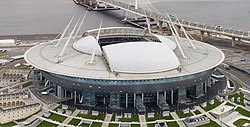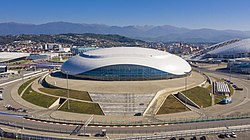2020 Winter Invictus Games: Difference between revisions
mNo edit summary |
|||
| Line 83: | Line 83: | ||
*{{flag|Amathia}} | *{{flag|Amathia}} | ||
*{{flag|Ajahadya}} | *{{flag|Ajahadya}} | ||
*{{flag|Brumah}} | |||
*{{flag|Cassier}} | *{{flag|Cassier}} | ||
*{{flag|Cavunia}} | *{{flag|Cavunia}} | ||
Revision as of 00:22, 26 January 2020
This article is incomplete because it is pending further input from participants, or it is a work-in-progress by one author. Please comment on this article's talk page to share your input, comments and questions. Note: To contribute to this article, you may need to seek help from the author(s) of this page. |
 | |||
| Host city | Ulan Khol, Narozalica | ||
|---|---|---|---|
| Motto | On the ice (Narodyn: На льоду) | ||
| Events | 15 | ||
| Opening | 7 February | ||
| Closing | 23 February | ||
| Stadium | KolonetsArena | ||
| Summer | |||
| |||
The 2020 Winter Invictus Games, officially called the XII Winter Invictus Games (Gaullican: Les XIIe Jeux invictus d'hiver; Narodyn: XII Зимові Ігри Інвіцтус), but more commonly and colloquially known as Ulan Khol 2020 is the 12th edition of the Winter Invictus Games, an international winter sports competition, scheduled to be held in Ulan Khol, Narozalica, between February 7 and February 20.
Ulan Khol was chosen as the host city for the games in 2017, fending off competition from Nouvelle-Rayenne in Cassier and Ostapils-Baihaven in Swetania. The Games will be held primarily at the KolonetsArena within the city, which has a capacity of 65,000, and will also be the venue for the opening and closing ceremonies. Ulan Khol 2020 will be the first Winter Invictus Games and the second Invictus Games tournament to be held in Narozalica.
Bidding
Bidding began for the 2020 Winter Invictus Games as early as 2011, with a total of 17 cities across all continents submitting a city to the Invictus Committee to be voted upon. Nine cities were eliminated in Round 1 of voting, three in Round 2 and two in Round 3. Among the eliminated cities were Västdal in Ordennya, Paltamo in Velzemia, Rosenborg in Varienland and Keisi in Senria. The final vote for the host city was held in 2016 in Westbrücken, Werania, with Ulan Khol's bid emerging as the winner.
| City | Nation | Votes |
|---|---|---|
| Ulan Khol | 16 | |
| Nouvelle-Rayenne | 9 | |
| Ostapils-Baihaven | 7 |
Venues
Ulan Khol
Ulan Khol has four existing stadiums and two new stadiums that will feature as venues for the 2020 Winter Invictus Games. The largest - KolonetsArena - will host the opening and closing ceremonies, although will not feature for any of the sporting events. New stadiums such as the Chashka Stadium will feature ice hockey and figure skating.
- KolonetsArena – opening and closing ceremonies / 65,000 existing
- Chashka Stadium – ice hockey, figure skating and speed skating / 18,000 new
- Gornoye Stadium – curling / 4,300 new
- Vitivka Arena – ice hockey / 9,000 new
- Ulan Khol Invictus Village – Athlete accommodation
The village will be newly built on land around 0.5 miles south of Ulan Khol
Surrounding towns
- Catorgaz Arena – bobsleigh, luge and skeleton / 3,700 existing
- Kupin Resort – snowboarding, freestyle skiing, alpine skiing, combined skiing
- Gutsiska Ski Resort – biathlon
Transport
Ulan Khol is well connected within Narozalica, and serves as an urban hub in the centre of the country. The city is close to the border with Yavorstrana, and can be easily accessed by air or rail from most of Euclea. Travelling by road is more difficult due to incidents at Crossing 93 making it impossible to drive between Narozalica and Velzemia. Ulan Khol is connected by high speed rail to Samistopol and Patovatra, the two largest cities in Narozalica, and has a three-runway international airport. The city can be accessed by ferry up the Dolomit river from Yavorstrana and Minilov.
Ulan Khol itself has a small existing metro, but stations are being opened and renovated for the Invictus Games, with the new Invictus Line of the metro system travelling between each of the stadiums. Ulan Khol has inner-city rail that travels between most locations in the city, as well as an expansive network of roads, trams, and taxi services.
Budget
The budget for the Games is estimated to be around 5.5 billion Euclo, making it one of the most expensive Winter Invictus Games in history, however this figure also includes renovations for transport inside Ulan Khol in preparation for the Games, while the budget for the Games itself is likely around 4 billion Euclo.
Participating National Invictus Committees
| Participating National Invictus Committees |
|---|
Opening and closing ceremonies
The opening and closing ceremonies will include many aspects that allude to Ulan Khol's history of Zalyk inhabitance, with the city itself founded by Zalyk settlers around 900 AD. Along with this, it will feature musical performances by some of the world's biggest stars and will feature traditional instances of Narozalic culture as a whole.
Broadcasting
Amathia - Amathian Television Company - AMTV
 Ajahadya - 8X8 Sports TV
Ajahadya - 8X8 Sports TV Cassier - SRC/Radio-Cassier, Cascom Media, Rogier Media, TLG
Cassier - SRC/Radio-Cassier, Cascom Media, Rogier Media, TLG Cavunia - KavSport
Cavunia - KavSport Garambura – Unposhi TV
Garambura – Unposhi TVGaullica - Gaullican Broadcasting Company, GBC Sport
- File:ImaguaFlag.png Imagua and the Assimas - Imaguan Television Service
 Jindao – Jindanese Broadcasting Company, Honghua Network
Jindao – Jindanese Broadcasting Company, Honghua NetworkMontecara – Telè1
 Narozalica – Narnet Sports
Narozalica – Narnet Sports- File:RwizikuruFlag.PNG Rwizikuru - NMR
 Satucin - MHTV, MHTV Sports
Satucin - MHTV, MHTV Sports Senria - Senria Broadcasting Corporation, Senzou TV Sport
Senria - Senria Broadcasting Corporation, Senzou TV SportSwetania – Panswetanian Television, Programm 2
 Tinza – Tinzan State Broadcasting Corporation
Tinza – Tinzan State Broadcasting Corporation Velzemia - Channel 1, C6 Velzemia
Velzemia - Channel 1, C6 Velzemia Zorasan - UCTV Sport
Zorasan - UCTV Sport

